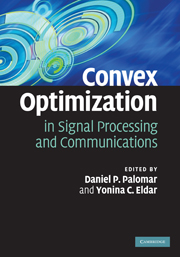Book contents
- Frontmatter
- Contents
- List of contributors
- Preface
- 1 Automatic code generation for real-time convex optimization
- 2 Gradient-based algorithms with applications to signal-recovery problems
- 3 Graphical models of autoregressive processes
- 4 SDP relaxation of homogeneous quadratic optimization: approximation bounds and applications
- 5 Probabilistic analysis of semidefinite relaxation detectors for multiple-input, multiple-output systems
- 6 Semidefinite programming, matrix decomposition, and radar code design
- 7 Convex analysis for non-negative blind source separation with application in imaging
- 8 Optimization techniques in modern sampling theory
- 9 Robust broadband adaptive beamforming using convex optimization
- 10 Cooperative distributed multi-agent optimization
- 11 Competitive optimization of cognitive radio MIMO systems via game theory
- 12 Nash equilibria: the variational approach
- Afterword
- Index
11 - Competitive optimization of cognitive radio MIMO systems via game theory
Published online by Cambridge University Press: 23 February 2011
- Frontmatter
- Contents
- List of contributors
- Preface
- 1 Automatic code generation for real-time convex optimization
- 2 Gradient-based algorithms with applications to signal-recovery problems
- 3 Graphical models of autoregressive processes
- 4 SDP relaxation of homogeneous quadratic optimization: approximation bounds and applications
- 5 Probabilistic analysis of semidefinite relaxation detectors for multiple-input, multiple-output systems
- 6 Semidefinite programming, matrix decomposition, and radar code design
- 7 Convex analysis for non-negative blind source separation with application in imaging
- 8 Optimization techniques in modern sampling theory
- 9 Robust broadband adaptive beamforming using convex optimization
- 10 Cooperative distributed multi-agent optimization
- 11 Competitive optimization of cognitive radio MIMO systems via game theory
- 12 Nash equilibria: the variational approach
- Afterword
- Index
Summary
Game theory is a field of applied mathematics that describes and analyzes scenarios with interactive decisions. In recent years, there has been a growing interest in adopting cooperative and non-cooperative game-theoretic approaches to model many communications and networking problems, such as power control and resource sharing in wireless/wired and peer-to-peer networks. In this chapter we show how many challenging unsolved resource-allocation problems in the emerging field of cognitive radio (CR) networks fit naturally in the game-theoretical paradigm. This provides us with the mathematical tools necessary to analyze the proposed equilibrium problems for CR systems (e.g., existence and uniqueness of the solution) and to devise distributed algorithms along with their convergence properties. The proposed algorithms differ in performance, level of protection of the primary users, computational effort and signaling among primary and secondary users, convergence analysis, and convergence speed; which makes them suitable for many different CR systems. We also propose a more general framework suitable for investigating and solving more sophisticated equilibrium problems in CR systems when classical game theory may fail, based on variation inequality (VI) that constitutes a very general class of problems in nonlinear analysis.
Introduction and motivation
In recent years, increasing demand of wireless services has made the radio spectrum a very scarce and precious resource. Moreover, most current wireless networks characterized by fixed-spectrum assignment policies are known to be very inefficient considering that licensed bandwidth demands are highly varying along the time or space dimensions (according to the Federal Communications Commission [FCC], only 15% to 85% of the licensed spectrum is utilized on average [1]).
- Type
- Chapter
- Information
- Convex Optimization in Signal Processing and Communications , pp. 387 - 442Publisher: Cambridge University PressPrint publication year: 2009
- 4
- Cited by

